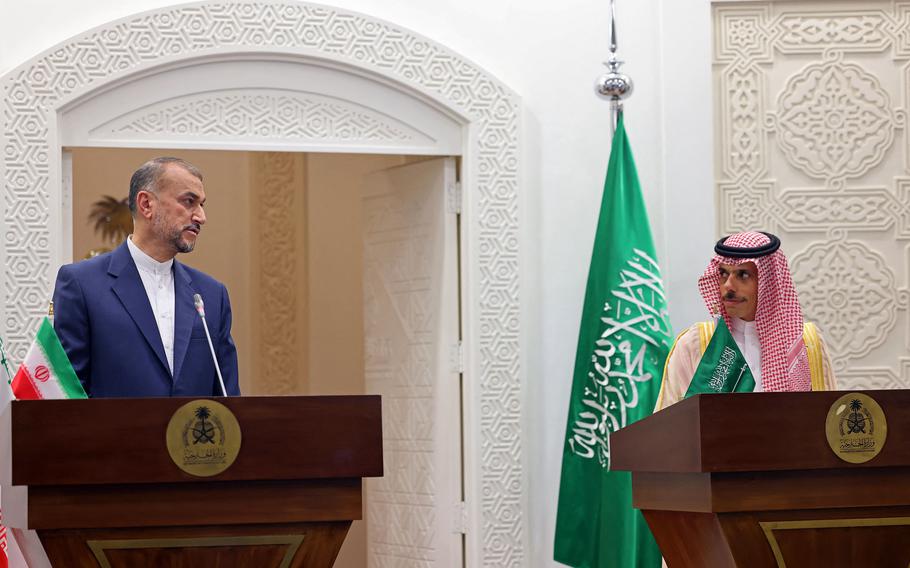
Iran’s Foreign Minister Hossein Amir-Abdollahian, left, and his Saudi counterpart Faisal bin Farhan hold a joint news conference in Riyadh, Saudi Arabia, Aug. 17, 2023. (Fayez Nureldine, AFP/Getty Images/TNS)
(Tribune News Service) — It has been as unsurprising as it is grotesque to see Iran’s leaders applaud Hamas’ “victory” even as evidence of atrocities against Israeli women and children mounts. From here on, the outlook becomes much more complicated for Tehran, but so too for Israel and the U.S. We still don’t know exactly what role Iran played in Saturday’s attack on Israel by Hamas, but there’s growing evidence that Tehran’s client at least asked permission, and that means Israeli and U.S. policymakers will have to factor it into their responses.
Iran is no longer as isolated or vulnerable as it once was. The war in Ukraine has shuffled geopolitical alignments and, as a result, possibly for the first time since the 1979 revolution, Tehran can count on powerful friends to give it at least diplomatic protection. Its role in providing Moscow with attack drones for its invasion of Ukraine has ensured that.
Andrey Gurulyov, a former Russian military commander and now member of parliament for the ruling United Russia party, said on his Telegram channel Monday: “We and China will not allow the adoption of an anti-Iranian resolution in the UN Security Council.” Gurulyov isn’t in the Kremlin, so he doesn’t make the decisions, but it’s unlikely he’s wide of the mark. A China-brokered agreement to restore Tehran’s relations with Saudi Arabia has also helped to stabilize that relationship.
The importance of Iran’s oil supply to suppressing prices on the global market, and its potential to disrupt much larger flows through the Strait of Hormuz also offer a measure of leverage, if not protection.
At the same time, as many have said already, the process of normalizing relations between Israel and the Arab world had been making progress since the 2020 U.S.-brokered Abraham accords. A deal adding Saudi Arabia was on the table, even as Israel embarked on a no-concessions policy in dealing with Palestinians living in Gaza and the West Bank. All that hit a wall on Saturday — a clear win for Iran.
For Hamas and Iran’s clerical leadership, both dedicated to eradication of Israel, the Jewish state’s regional normalization had been humiliating and called in question their purpose — either as a self-styled strike force for the Palestinian cause or as a revolutionary Islamic Republic. The Hamas attack is precisely the kind of ostentatiously disruptive operation Iran has wanted to see for years, and offers a welcome distraction from its many internal problems.
The 1979 revolution is today a gerontocracy. Its battle cries of “Death to Israel’’ and “Death to America’’ no longer resonate with the growing majority of the population that has only known rule by an Islamist dictatorship it despises. Decades of U.S. and then European sanctions have failed to force a change of regime behavior, but they have stunted the development of a potentially vibrant economy.
The urban classes have revolted over liberties, the poor over lack of means and prospects, and women over their brutal repression by the deeply misogynistic cult that runs the country. None of these mass protests have succeeded, because the Islamic Revolutionary Guard Corps remains ready and willing to kill to protect the regime, yet they have left an out-of-touch leadership insecure.
For the Iranian regime, the main concern is that war with an enraged Israel, fully backed by the force of the U.S., could if miscarried be its last fight, or equally could mark the end of Hezbollah, its proxy force in Lebanon, says John Raine, a Middle East specialist and senior adviser for Geopolitical Due Diligence at the international Institute for Strategic Studies in London. That’s why Iran has in recent years tried to avoid a direct conventional war with either.
At the same time, the challenge for the U.S. and Israel is punishing Iran without just expanding the coming conflict’s cost and destruction for themselves. Invading a nation of 88 million that’s cut through by mountains and more than 2.5 times the size of Ukraine isn’t an option. Strikes on the IRGC and its proxy forces outside Iran can have an impact, yet the Iranians need to present sufficient targets to be hit, and may not oblige.
Airstrikes within Iran could even do Supreme Leader Ali Khamenei a favor, prompting his domestic opponents to rally against a common foreign threat. Relatively few ordinary Iranians would relish picking a fight with the U.S. or Israel, but it’s worth remembering that Qassem Soleimani, the IRGC Al-Quds force head assassinated by the U.S. in Iraq, in 2020, was one of the nation’s most popular figures. Even regime opponents backed the idea of fighting Sunni radicals such as Islamic State abroad, so they would not have to do so at home.
The pressure on both Israel and Iran to expand Operation Iron Sword against Hamas into a regional war is real. But a wider war is far from inevitable. Iran’s ultra-conservative leadership “will lionize Hamas as this fight goes on, but the time will come when it is under pressure to put its money where its mouth is, because Hamas will have its hat out there for help,’’ says Raine. In Syria and Iraq, that meant sending IRGC personnel to the front lines, but the stakes in Gaza are much higher. Even Hamas, having made sure Israel would have to attack its stronghold in Gaza, can’t be sure if Iran’s aging Islamist revolutionaries will come to its rescue.
Marc Champion is a Bloomberg Opinion columnist covering Europe, Russia and the Middle East. He was previously Istanbul bureau chief for The Wall Street Journal. This column does not necessarily reflect the opinion of the editorial board or Bloomberg LP and its owners.
©2023 Bloomberg L.P.
Visit bloomberg.com/opinion.
Distributed by Tribune Content Agency, LLC.